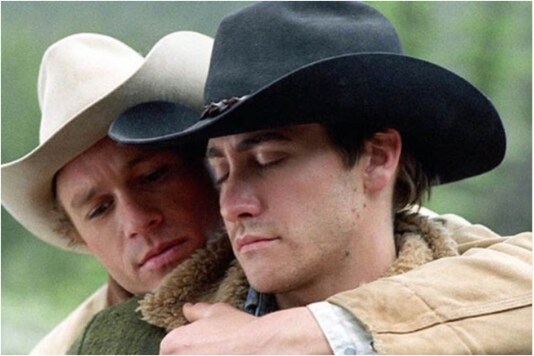Time was, not very long ago, when Indian cinema played coy with sexual intimacy. No kissing, oh no, no way. No petting. And, no making love. This was sacrilegious. So, our heroes and heroines, very much in love with each other on screen, had to stay at arm's length, or just about. The camera will veer away from them when they were “feeling sexy” and focus on two doves pecking each other. Or, show two flowers in full bloom, one swaying towards the other and gently caressing it.
Of course, Indian movies got bolder with time. We have lovers kissing, petting, and, give and take, a scene or two of sex under the sheets! With the arrival of streaming giants like Netflix, Amazon, Hotstar and the like, men and women got on to a much higher degree of cuddling, smooching and kissing. Women bared their breasts, yes Indian actresses, because, as they explained to those who questioned them, the story demanded this.
But, we are still nowhere near European cinema. Remember the Danish enfant-terrible, Lars Von Trier, and his movies. They were explicit to the core, and some of them, I am told, went beyond simulated sex. I have no idea whether this is true. However, the sex sequences were long, detailed and were without any holds-barred.
I recall two movies by other directors that left precious little to imagination. Vincent Gallo's The Brown Bunny was one, and it premiered at the 2003 Cannes Film Festival. It was produced, written, directed, photographed and edited by Gallo himself. He also starred in it along with Chloe Sevigny. It was a story about a motorcycle racer on a cross-country drive who is haunted by the memories of his ex-lover. Nothing happens in the movie till the very end, when see a very, very explicit sex performance.
Last year, again at Cannes, we had avant-garde Franco-Tunisian Abdellatif Kechiche’s Mektoub's My Love: Intermezzo. This is what I wrote in these columns during the 2019 Festival. “Unlike his earlier Blue is the Warmest Colour, a lesbian tale which had a great story, a great screenplay and great message that helped it to win the Palme dÓr in 2013 – Kechiche’s latest outing has very little of these.
“Part of the Festival's prestigious competition, Mektoub My Love... had precious little to say in all its three-and-a-half hours of run time (the Festival cut about 30 minutes just before it was screened), except taking us on a voyeuristic voyage. A liberal display of female bottoms on the beach that took about 30 minutes followed by one long scene in a night club – where girls and boys gyrate to the beat of music. They dance body to body, kissed all and sundry, and finally the movie takes us inside a toilet for a 20-minute scene of unsimulated oral sex. Nothing, nothing at all left to imagination!”
However, the current Coronavirus pandemic is saying stop to all this intimacy. Writers and directors in, for instance, the UK are being told gently to avoid sex, even kissing. They are being encouraged to “seek inspiration from classic romances such as Casablanca and ditch depictions of sex altogether when planning intimate scenes under new guidelines for directing during the Covid-19 crisis”, according to a report in The Guardian.
I wonder why the film guys were not advised to take a look at Indian classics!
The new “guidelines suggest that characters could be shown fixing their own clothes/re-dressing after the event or limbs could be depicted moving under bedclothes, while another option is to show the closing of a bedroom door and leave the action to the viewer’s imagination.”
Well, what about a pair of birds or a couple of flowers?
“For productions that (absolutely) require sex scenes, alternative ideas from the guidelines include motion capture and digital performances, green screen or animation to composite the required encounter, and another suggested option is casting real life couples who won’t need to socially distance."
Bill Anderson, who has helmed Doctor Who and was part of the team that worked on the guidelines said: “Intimacy is not biology, it’s about mutual vulnerability, an openness and sharing of trust between human beings. If you shoot a sex scene that doesn’t have intimacy in it you’ve totally failed – what you’ve produced is a poorer cousin of pornography.”
Director Jessica Hobbs, who has worked for the soon-to-arrive Netflix’s The Crown, said: “For the next few months at least, maybe a year we need to be creative in the way we approach intimacy. We’re not saying ‘shut everything down’, we’re saying let’s look at our material and try to make it safe in the current climate.”
So, no sex on screen – not for some time.
(Gautaman Bhaskaran is author, commentator and movie critic)










